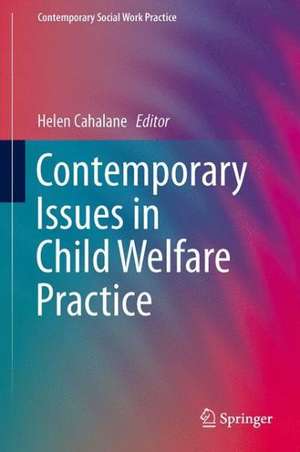Contemporary Issues in Child Welfare Practice: Contemporary Social Work Practice
Editat de Helen Cahalaneen Limba Engleză Hardback – 28 noi 2013
| Toate formatele și edițiile | Preț | Express |
|---|---|---|
| Paperback (1) | 504.74 lei 38-45 zile | |
| Springer – 23 aug 2016 | 504.74 lei 38-45 zile | |
| Hardback (1) | 567.85 lei 38-45 zile | |
| Springer – 28 noi 2013 | 567.85 lei 38-45 zile |
Preț: 567.85 lei
Preț vechi: 701.05 lei
-19% Nou
Puncte Express: 852
Preț estimativ în valută:
108.66€ • 113.45$ • 89.93£
108.66€ • 113.45$ • 89.93£
Carte tipărită la comandă
Livrare economică 31 martie-07 aprilie
Preluare comenzi: 021 569.72.76
Specificații
ISBN-13: 9781461486268
ISBN-10: 1461486262
Pagini: 336
Ilustrații: XIV, 319 p. 10 illus.
Dimensiuni: 155 x 235 x 27 mm
Greutate: 0.64 kg
Ediția:2013
Editura: Springer
Colecția Springer
Seria Contemporary Social Work Practice
Locul publicării:New York, NY, United States
ISBN-10: 1461486262
Pagini: 336
Ilustrații: XIV, 319 p. 10 illus.
Dimensiuni: 155 x 235 x 27 mm
Greutate: 0.64 kg
Ediția:2013
Editura: Springer
Colecția Springer
Seria Contemporary Social Work Practice
Locul publicării:New York, NY, United States
Public țintă
Professional/practitionerCuprins
Child Welfare Practice in a Systems of Care Framework.-"They Brought Me In Like I Was Their Own Kid": Youth and Caregiver Perceptions of Out-of-Home Care.- Family Engagement Strategies in Child Welfare Practice.- Permanency.- Transitioning to Adulthood: Promoting Youth Engagement, Empowerment and Interdependence Through Teaming Practices.- Lesbian, Gay, Bisexual, Transgendered, Questioning and Queer Youth: The Challenge for Child Welfare.- Race, Racial Disparity and Culture in Child Welfare.- Skill-based Training and Transfer of Learning.- Stress and Child Welfare Work.- Reflective Practices in Supervision: Why Thinking and Reflecting are as Important as Doing.- Organizational Effectiveness Strategies for Child Welfare.- Managing for Outcomes in Child Welfare.- Conclusions and Future Directions.
Notă biografică
Dr. Helen Cahalane is Clinical Associate Professor and Principal Investigator of the Child Welfare Education and Research Programs at the University of Pittsburgh School of Social Work. Dr. Cahalane oversees a continuum of child welfare programs providing education, training, technical assistance, support for best practices and organizational improvement which include the Pennsylvania Child Welfare Training Program, the Child Welfare Education for Baccalaureates Program, and the Child Welfare Education for Leadership Program. Dr. Cahalane is involved in several applied research projects in child welfare targeting developmental and social-emotional screening of young children substantiated for abuse and neglect, caseworker visitation and family engagement practices, and organizational factors influencing the retention of child welfare professionals. Dr. Cahalane also teaches in the School of Social Work and has been recognized as a Chancellor’s Distinguished Teacher of the University of Pittsburgh. Dr. Cahalane is a licensed clinical social worker and Expert Witness for the Bureau of Occupational and Professional Affairs, Commonwealth of Pennsylvania.
Textul de pe ultima copertă
Throughout the country, child welfare systems are at a crossroads. Demands for evidence-driven practice coupled with budget cuts, funding limits, and the call for client-driven services are contributing to a transformation in the field. Not surprisingly, with this reform comes the need for a higher level of professional education on the part of its practitioners.
A seminar between covers, Contemporary Issues in Child Welfare Practice presents a clear picture of practice in today's child protection landscape: its challenges and opportunities, and the insights every professional needs. Chapters map out an integrated systems of care framework that coordinates services across mental health and other agencies while encouraging collaboration with families and the community. Topics span theoretical and hands-on practice imperatives from racial and cultural issues, to managing for outcomes, to concepts of permanency. And the book's case studies offer salient first-person perspectives from children, families, and caseworkers. Featured in the coverage:
A seminar between covers, Contemporary Issues in Child Welfare Practice presents a clear picture of practice in today's child protection landscape: its challenges and opportunities, and the insights every professional needs. Chapters map out an integrated systems of care framework that coordinates services across mental health and other agencies while encouraging collaboration with families and the community. Topics span theoretical and hands-on practice imperatives from racial and cultural issues, to managing for outcomes, to concepts of permanency. And the book's case studies offer salient first-person perspectives from children, families, and caseworkers. Featured in the coverage:
- Family engagement strategies in child welfare practice.
- Promoting youth engagement, empowerment, and interdependence through teaming practices.
- LGBTQ youth: the challenge for child welfare.
- Training and transfer of learning.
- Reflective practices in supervision: why thinking and reflecting are as important as doing.
- Stress and child welfare work.
- Organizational effectiveness strategies for child welfare.
Caracteristici
Discusses special issues such as working with foster care and kinship care families Includes special populations such as LGBTQ youth and racial minorities Provides an overview of the key family engagement practices Addresses policy issues















